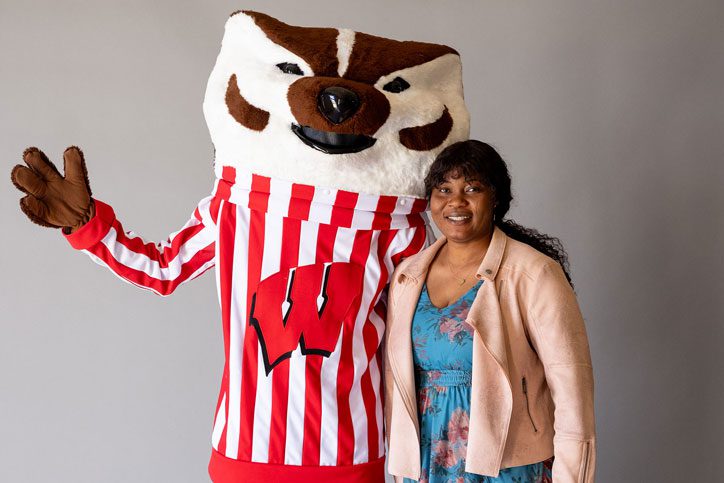 Zalissa Zongo Kafano celebrates with Bucky Badger at an awards night for UW–Madison’s outstanding adult students on April 24, 2024.
Zalissa Zongo Kafano celebrates with Bucky Badger at an awards night for UW–Madison’s outstanding adult students on April 24, 2024.
The eldest of 11 siblings, Zalissa Zongo Kafando embarked on a life-changing journey in 2018. Fleeing the increasing political instability of Burkina Faso, West Africa, she sought a better life for herself and her children. Despite already earning an associate degree in her home country, she aspired to earn a four-year degree.
Fast forward six years and thousands of miles to the University of Wisconsin–Madison, where Kafando, a first-generation college student, will earn her bachelor’s degree in computer science this fall.
It takes incredible resilience to return to college later in life, particularly for those with jobs, families and other responsibilities. Fortunately, scholarships can help older students like Kafando tackle financial limitations and pursue their academic goals.
“Leaving behind my family, friends and career to start a new journey in the U.S. was undoubtedly the greatest risk I have ever embraced,” she said. “Yet, it stands as the most transformative decision of my life, granting me the opportunity to pursue a fresh start and my educational dreams.”
A lifeline for degree completion
As of fall 2021, 19 million students aged 25 and over were enrolled in postsecondary institutions across the United States (source: National Center for Education Statistics). Many of these are part of the 40 million U.S. adults with some college credit but no degree.
One misconception I encounter as an advisor is that returning adult students are ineligible for scholarships and other forms of financial aid. This is far from the truth! Most returning adult students are eligible for traditional federal student aid, grants and scholarships, as well as numerous scholarships specifically designed for older students.
Scholarships at UW–Madison for returning adult students include those for veterans, working adults, single parents and individuals with past involvement in the criminal justice system. Scholarships vary by institution, so start your scholarship search by checking in with your school’s financial aid office. You can also find scholarships using search tools and online resources at CareerOneStop and the College Board.
Funding futures
After restarting her academic career at Madison College, Kafando transferred to UW–Madison to complete her four-year degree. She used the university’s scholarship hub to find resources to help her pay for her education as a returning adult. This year, her award included the Bernard Osher Reentry Scholarship, which supports undergraduates who have experienced a gap in their education of at least five years.
“The impact of these scholarships on my personal and academic journey is immeasurable,” she said. “They cover my tuition each year, allowing me to focus entirely on my educational pursuits without the burden of high loans.”
This summer, Kafando will participate in a two-month internship in France and plans to become a software engineer after graduation.
“This achievement fills me with gratitude and pride, not only for what I have accomplished so far but also for the example I can set for my children,” Kafando said. “I extend my heartfelt thanks to all the generous donors who have changed my life and empowered me to be a role model for my children.”
The Lifelong Learner is a monthly feature written by UW–Madison’s Continuing Studies staff. Anne Niendorf, a student services coordinator, can be reached at anne.niendorf@wisc.edu. This article was first published in the Wisconsin State Journal on May 12, 2024.